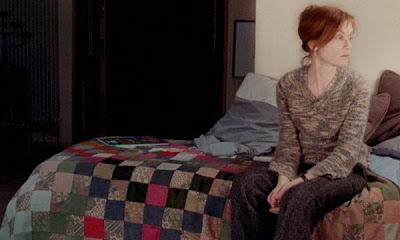Seidner’s photographs are cool, detached, lending to each image something I find unnerving. Others describe various kinds of passion in the imagery, but I don’t see that. I see an outsider, almost a Leonard Zelig with a camera, who can assimilate perfectly any photographic style and yet remains apart.
Seidner died of AIDS, and in his work I see a conflation of Susan Sontag’s writings both on photography and on “illness as metaphor.” It’s unfair to reduce him to such a simplistic critique, I know, and yet I keep coming back to it. I’m grasping at straws, really, trying to understand what I see. Long before he grew ill, he regarded the human body with a clinical curiosity. And until the end of his life, the human body — draped in couture or naked, full-length or bust — was his constant subject.

© International Center of Photography, David Seidner Archive
An early, full-length portrait of Robert Mapplethorpe is rendered in five distinct images, as if cut up yet, in fact, scrupulously planned, captured, and arranged in separate shots. One sees the portrait simultaneously as a single image and as fractured pieces: is it my eye or Seidner’s that fills in the interstices? Is it he or I who grasp the whole? Is Seidner dissecting or restoring? I’ve been looking at that/those picture/s for a couple of years, and I’m still struggling with these questions. At every turn in his career, Seidner sees great beauty, but he has no intention of making it easy for us.
A series of facial portraits of important artists, part of a series that includes the self-portrait reproduced here, exploits the stark contrasts of lighting in the paintings of Caravaggio or Rembrandt, yet because the images are in black and white, we’re not given the flesh tones that the masters used (grudgingly, in Caravaggio’s work) and that are described, technically as well as emotionally, as “warm.” The stony faces are unsmiling, unfrowning, neutral, and others have compared them to Roman statuary, the portrait busts of emperors and generals, in whose marble eyes one must search to find any feeling or story.
We know that Seidner admired the artists he shot, yet his pictures suggest that they are mere mortals, like him. He stands smack in their faces and remains far outside them all the while, and in doing so, he keeps the viewer at a distance, too.
The examples I’ve seen of his fashion photography betray a similar austerity, even when the clothing worn by the models attains flamboyance. We’re in the realm of the Second Empire portraitists here, Ingres and his followers and rivals, in the careful compositions, the almost lacquered surfaces of Seidner’s images.
There are exceptions, of course, and a portrait of the soprano Jessye Norman is one. He makes her beautiful, tender, in ways that other photographers have not managed, and it comes as no surprise to learn that they were friends. As far as Norman was concerned, Seidner wasn’t an outsider at all; their correspondence fairly glows. I’ve followed Norman’s career for a lot longer than Seidner’s, and thought I understood her. Yet I didn’t expect her openness or her avid intellectual curiosity about all the arts. I can’t say that the photograph revealed her to me — the letters did that. But the woman in the letters is the woman in the picture, and I’d never seen her before.

But such pictures are atypical, as I say, and the rest of the work in this exhibition remains troubling to me. A series of black-and-white academic nudes is almost erotic: the models are in far better shape than the Greek gods of sculpture whom we invoke when we admire physical beauty in the flesh. They are, in short, superb. Yet as image piles upon image, I realize that the models are all standing in the same two poses, identical front and back, male and female. The effect is somewhat creepy, as if one were reviewing a lineup of a Master Race. Is there a connection here? Seidner was Jewish, gay, and soon to be ill — but there’s no overt political statement I can see.
As AIDS afflicted him, he took steroids and went to the gym, taking a series of self-portrait nudes in which the distinctions between man and machine are abandoned. Finally, unable to manipulate the camera as he used to, he used an auto-focus for a series of vividly colored photos of orchids in close-up that renders much of the image indistinct. The backgrounds are brightly colored, too, equally but contrastingly so. These are the colors of the Fabulous Fifties, and Seidner’s childhood, as if in a last attempt to reconcile who he was with who he had been brought up to be. Yet he’s still an outsider, held at such a distance now that he can no longer see clearly.
Whether he’s inspired by ancient sculptors or John Singer Sargent (in an uncanny series of portraits not included in the current exhibition) or the rotogravure colors of the popular culture he grew up with, Seidner is able to incorporate the stylistic concerns of earlier schools of art with precision. It’s not mimicry, though, it’s synthesis — it’s very nearly a Darwinian adaptation. Gilles sees a dialogue between, on one side, that perfect stylistic technique and, on the other, the strangely dispassionate passion Seidner brings to each image. He may be right.
But I have yet to hear precisely what is being said in that dialogue, and perhaps this is why I keep coming back to the pictures. Maybe that’s all Seidner wanted: to make me look, then look again; to make me think, and on those occasions when he made me feel, to make me question what the feeling was, and why I felt it.
Fondation Pierre Bergé–Yves Saint-Laurent
5 Avenue Marceau
75116 Paris
Hours: 11 AM to 6 PM, Tuesday through Sunday
+33 (0) 1-44-31-64-31
www.fondation-pb-ysl.net
Read more!




















































